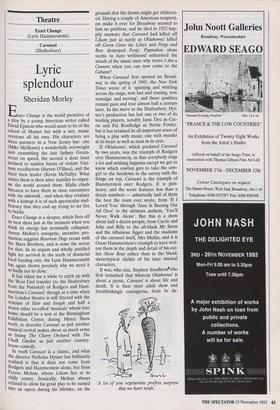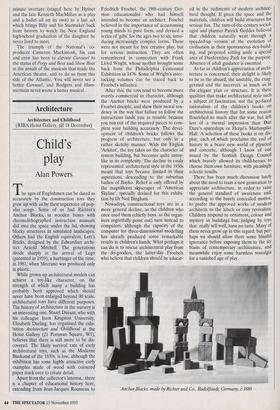Theatre
Exact Change (Lyric Hammersmith) Carousel (Shaftesbury)
Lyric splendour
Sheridan Morley
Exact Change is the world premiere of a play by a young American writer called David Epstein who would seem to be of the school of Mamet but with a wry, manic overtone all his own. His characters are three partners in a New Jersey bar: one (Mike McShane) a wonderfully overweight Slob resembling the late Sydney Green- street on speed, the second a dour loser inclined to sudden bursts of violent Viet- nam recollection (Steven O'Shea), and the third their leader (Kevin McNally). What Unites them is their utter inability to organ- ise the world around them. Mafia chiefs threaten to have them in close encounters With the sidewalk, and when they retaliate With a kidnap it is of such spectacular inef- ficiency that they end up trying to set fire to bricks.
. Exact Change is a sleeper, which fires off its best shots just at the moment when you think its energy has terminally collapsed. Aaron Mullen's energetic, inventive pro- duction suggests Reservoir Dogs recast with the Marx Brothers, and is none the worse for that. In its urgent and wholly justified fight for survival in the teeth of shameful local funding cuts, the Lyric Hammersmith has again shown precisely why we need it SO badly not to close. It has taken me a while to catch up with the West End transfer (to the Shaftesbury from the National) of Rodgers and Ham- Merstein's Carousel, though at a time when the London theatre is still littered with the remains of Hair and Joseph and half a dozen other so-called 'musicals' whose true home should be a tent at the Birmingham Exhibition Centre during Motor Show week, to describe Carousel as just another musical revival makes about as much sense as listing The Cheny Orchard with The Chalk Garden as just another country- house comedy. In truth Carousel is a classic, and what the director Nicholas Hytner has brilliantly realised is that it does not come from Rodgers and Hammerstein alone, but from Ferenc Molnar, whose Liliom lies at its Chilly centre. Ironically, Molnar always refused to allow his great play to be turned into an opera during his lifetime, on the grounds that the drama might get obliterat- ed. Having a couple of American songwrit- ers make it over for Broadway seemed to him no problem, and he died in 1952 hap- pily unaware that Carousel had killed off Liliom just as surely as Oklahoma! killed off Green Grow the Lilacs and Porgy and Bess destroyed Porgy. Pygmalion alone seems to have -withstood unharmed the attack of the music men: why revive I Am a Camera when you can now come to the Cabaret?
When Carousel first opened on Broad- way in the spring of 1945, the New York Times wrote of it 'spinning and whirling across the stage, now fast and rousing, now nostalgic and moving', and those qualities remain pure and true almost half a century later. In the move to the Shaftesbury, Hyt- ner's production has lost one or two of its leading players, notably Janie Dee as Car- rie and Pat Routledge as Nettie Fowler, but it has retained its all-important sense of being a play with music, one with murder at its heart as well as stars in its eyes.
If Oklahoma!, which predated Carousel by two years, was the triumph of Rodgers over Hammerstein, in that everybody sings a lot and nothing happens except we get to know which cowboy gets to take the cow- girl to the hoedown in the surrey with the fringe on top, Carousel is the triumph of Hammerstein over Rodgers. It is plot- heavy, and the score features less than a dozen numbers — admittedly half of them the best the team ever wrote, from 'If I Loved You' through 'June Is Busting Out All Over' to the ultimate anthem, 'You'll Never Walk Alone'. But this is a show about half a dozen people, from Carrie and Julie and Billy to the all-black Mr Snow and the villainous Jigger and the madame of the carousel itself, Mrs Mullin, and it is Oscar Hammerstein's triumph to have writ- ten them in the depth and detail of his ear- lier Show Boat rather than in the bland, stereotypical clichés of his later musical characters.
It was, who else, Stephen Sondheinf who first remarked that whereas Oklahoma! is about a picnic, Carousel is about life and death. It is their most adult show and breathtakingly courageous, from its six- 'A lot of you vegetarians profess surprise that we have souls.' minute overture (staged here by Hytner and the late Kenneth MacMillan as a play and a ballet all on its own) to a last act which brings Billy and his Starmaker back from heaven to watch the New England high-school graduation of the daughter he never lived to meet.
The triumph of the National's co- producer Cameron Mackintosh, his cast and crew has been to elevate Carousel to the status of Porgy and Bess and Show Boat in the annals of the musicals that made the American theatre, and to do so from this side of the Atlantic. You will never see a better Carousel, and Rodgers and Ham- merstein never wrote a better musical.



























































 Previous page
Previous page